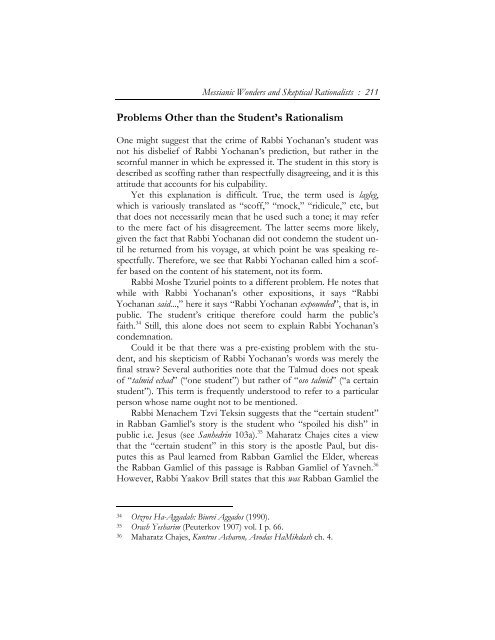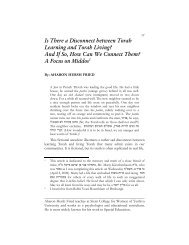Messianic Wonders and Skeptical Rationalists - Hakirah.org
Messianic Wonders and Skeptical Rationalists - Hakirah.org
Messianic Wonders and Skeptical Rationalists - Hakirah.org
Create successful ePaper yourself
Turn your PDF publications into a flip-book with our unique Google optimized e-Paper software.
<strong>Messianic</strong> <strong>Wonders</strong> <strong>and</strong> <strong>Skeptical</strong> <strong>Rationalists</strong> : 211<br />
Problems Other than the Student’s Rationalism<br />
One might suggest that the crime of Rabbi Yochanan’s student was<br />
not his disbelief of Rabbi Yochanan’s prediction, but rather in the<br />
scornful manner in which he expressed it. The student in this story is<br />
described as scoffing rather than respectfully disagreeing, <strong>and</strong> it is this<br />
attitude that accounts for his culpability.<br />
Yet this explanation is difficult. True, the term used is lagleg,<br />
which is variously translated as “scoff,” “mock,” “ridicule,” etc, but<br />
that does not necessarily mean that he used such a tone; it may refer<br />
to the mere fact of his disagreement. The latter seems more likely,<br />
given the fact that Rabbi Yochanan did not condemn the student until<br />
he returned from his voyage, at which point he was speaking respectfully.<br />
Therefore, we see that Rabbi Yochanan called him a scoffer<br />
based on the content of his statement, not its form.<br />
Rabbi Moshe Tzuriel points to a different problem. He notes that<br />
while with Rabbi Yochanan’s other expositions, it says “Rabbi<br />
Yochanan said...,” here it says “Rabbi Yochanan expounded”, that is, in<br />
public. The student’s critique therefore could harm the public’s<br />
faith. 34 Still, this alone does not seem to explain Rabbi Yochanan’s<br />
condemnation.<br />
Could it be that there was a pre-existing problem with the student,<br />
<strong>and</strong> his skepticism of Rabbi Yochanan’s words was merely the<br />
final straw? Several authorities note that the Talmud does not speak<br />
of “talmid echad” (“one student”) but rather of “oso talmid” (“a certain<br />
student”). This term is frequently understood to refer to a particular<br />
person whose name ought not to be mentioned.<br />
Rabbi Menachem Tzvi Teksin suggests that the “certain student”<br />
in Rabban Gamliel’s story is the student who “spoiled his dish” in<br />
public i.e. Jesus (see Sanhedrin 103a). 35 Maharatz Chajes cites a view<br />
that the “certain student” in this story is the apostle Paul, but disputes<br />
this as Paul learned from Rabban Gamliel the Elder, whereas<br />
the Rabban Gamliel of this passage is Rabban Gamliel of Yavneh. 36<br />
However, Rabbi Yaakov Brill states that this was Rabban Gamliel the<br />
34 Otzros Ha-Aggadah: Biurei Aggados (1990).<br />
35 Orach Yesharim (Peuterkov 1907) vol. I p. 66.<br />
36 Maharatz Chajes, Kuntrus Acharon, Avodas HaMikdash ch. 4.
















